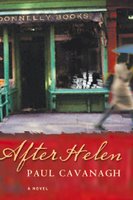 In 2004 the London International Book Fair held its inaugural “Lit Idol” contest modeled on the popular “Pop Idol” television show. Submitted as a 10,000-word manuscript, with accompanying two-page story outline, Paul Cavanagh’s After Helen was selected as winner out of a field of 1,500 competitors. Cavanagh’s completed novel (substantially more than 10,000-words) was picked up by HarperCollins Canada and released with a relative lack of fanfare when compared to the publicity surrounding his “Lit Idol” win.
In 2004 the London International Book Fair held its inaugural “Lit Idol” contest modeled on the popular “Pop Idol” television show. Submitted as a 10,000-word manuscript, with accompanying two-page story outline, Paul Cavanagh’s After Helen was selected as winner out of a field of 1,500 competitors. Cavanagh’s completed novel (substantially more than 10,000-words) was picked up by HarperCollins Canada and released with a relative lack of fanfare when compared to the publicity surrounding his “Lit Idol” win.After Helen is the story of the relationship between Irving Cruickshank and his daughter Severn, as they deal with the death of Helen. Irving, still reeling from the loss of his wife, has no idea how to deal with a teenage daughter. Severn, walled up inside herself with grief and anger, is quickly spinning out of control.
The match thrown into this powder keg is the reappearance of famous author Jack Livingston, Helen’s old lover. He is in town to promote his new novel - a tale of a young girl’s search for the truth about her bloodline, and a mother who has left her, set against the backdrop of Sir John Franklin’s doomed Arctic expedition. After meeting Jack at a book signing, Severn disappears and Irving’s memories of Helen come brilliantly to life as he chases the daughter he fears lost to him forever.
The question critics and readers will ask is this – does this “Lit Idol” winning, debut novel measure up to the bar set by its early promise?
Cavanagh chose to structure his novel in a discordant manner, alternating chapters told in the past and present. The reader is on a journey of discovery with Irving; however, we have only the briefest hint of current knowledge against which to position the flashes of his developing relationship with Helen. This disjointed narrative is unsettling for the reader, pushing one into feelings of anxiety and unease that invoke an immediate empathy for Severn and Irving.
Despite the deep connection the reader feels with Irving, the roller coaster of emotion brought on by the flashes between the birth of his relationship with Helen, and life after her death, quickly becomes overwhelming. Empathy turns to frustration as Irving’s tendency to function as an emotional doormat becomes more apparent. Just as the reader wants to leave the ride behind, Cavanagh pulls the book back onto the rails by having the storylines of the past and present converge.
Like the fictional author Jack Livingston, Cavanagh has taken a true-life plot and used it to cast light on modern day relationships. Whereas Livingston used Helen’s story to cast light on Franklin’s doomed expedition, Cavanagh has used the obsession of the explorer with the frozen north to look at the emotional wastelands that exist after a family member dies.
“Severn and I are no different. We’ve both become lost searching for Helen in a landscape of bitter emotions that we can barely begin to understand. It’s about our own survival now.”
Emlyn Rees, one of the “Lit Idol” judges, commented on Cavanagh’s eye for the little details that bring characters to life. It is his skill in evoking the sense of a character that distinguishes After Helen.
“I claw my way to the edge of the bed. I can’t summon the energy to sit up, so I lie on my belly and let my legs slide off the bed until I’m kneeling on the floor, my face still planted on the mattress…I feel like a little kid saying his bedtime prayers.”
Cavanagh has shaped engaging, realistic characters and, despite some irritation with Irving and Helen, After Helen is a promising debut. The little details show his developing ease with his craft, and vindicate Cavanagh’s win of the inaugural “Lit Idol”.
See the review posted at ReadySteadyBook: After Helen


No comments:
Post a Comment